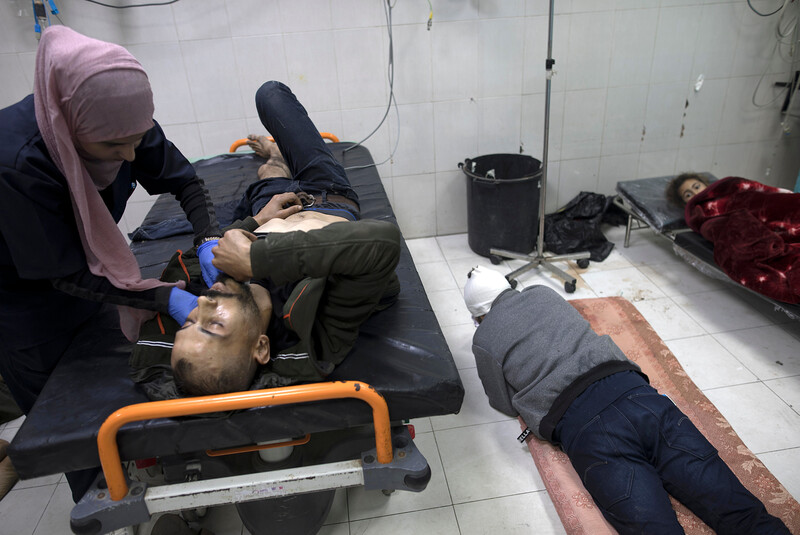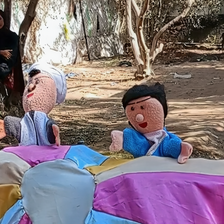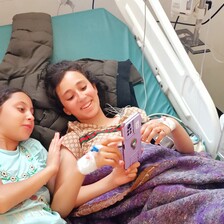The Electronic Intifada 6 October 2024

Israel’s targeting of Gaza’s medical sector has seen an estimated 70 percent of the territory’s hospital beds lost. Here, Nasser hospital in Khan Younis on 14 December 2023.
APA imagesMy brother-in-law, Yazan Younis, 28, his wife and two daughters, have been forcibly displaced six times since 13 October 2023 when the family first had to flee their home ahead of Israel’s genocidal onslaught.
During this time, he developed a problem urinating that prompted him to try to seek help.
The first problem that Yazan faced, however, was finding the right doctor.
Israel’s unhinged aggression and indiscriminate bombardment has decimated Gaza’s health sector. In September, the World Health Organization reported there had been more than 500 attacks on health care in less than a year, or some three attacks every two days.
These attacks have killed more than 1,000 health workers, according to Gaza’s ministry of health.
Israel has also prevented medicines and medical supplies from entry the territory, meanwhile, depleting stockpiles of both 70 percent and 83 percent, respectively, according to Gaza’s ministry of health.
Yazan visited several public hospitals in the southern Gaza Strip but found them all overwhelmed and understaffed to deal with the number of wounded from Israel’s bombings pouring in. As a non-urgent case, he quickly gave up on being seen.
It was a similar story at the Nasser Medical Complex in Khan Younis where he was told he would have to wait 28 days to see a urologist.
Yazan then tried his luck in private sector clinics. He visited the Yaffa Medical Hospital in the center of Deir al-Balah, where he found a urologist but no laboratory to conduct the necessary tests.
So Yazan went looking for private medical laboratories, only to learn most of them had been destroyed in Israeli bombings or had been forced to close due to power outages – Israel cut electricity (and food, fuel and gas) supplies when it imposed a ”complete siege on Gaza,” in the words of Yoav Gallant, Israel’s defense minister, as far back as last October.
After two weeks of searching, however, Yazan found the Balsam Medical Laboratory, which deployed a generator for electrical power.
No pain relief
All this time, his symptoms had been getting worse, the pain worsening every time he went to the toilet. So bad did it get, that he avoided drinking water as much as possible despite the intense summer heat at this point.
So when the test results came back that Yazan needed surgery to remove a polyp that had protruded from his bladder and was blocking part of the urethral opening, it came as little surprise.
The cost of the surgery at the Jaffa Medical Center, however, came to around $800, an amount equivalent to a senior salary before 7 October, and clearly prohibitive under Gaza’s current conditions.
Yazan waved away offers of help from relatives and friends, none of whom had the necessary funds anyway, and decided to go back to the government Nasser hospital for an operation.
He had to wait.
“There are half a million scheduled surgeries on the waiting list in Gaza hospitals,” Dr. Abdul Latif al-Hajj, of the health ministry, told The Electronic Intifada.
With just 17 out of 36 hospitals still functioning, and then just partially, across the Gaza Strip, all put out of commission in Israeli bombings, al-Hajj estimated that Gaza had lost 70 percent of their hospital bed capacity, further complicating matters for those needing surgery.
Nevertheless, Yazan was called in for surgery after 14 days, where he had to jostle for space with the many wounded, some of whom had to lie on the floor because of the lack of space.
Yazan’s surgery lasted just half an hour. But there was no convalescence. As soon as woke from his anesthesia, he was sent on his way.
And due to the lack of medicines, he was neither given, nor prescribed, pain medication.
Yazan is better now. He is back in his tent in Deir al-Balah where he and his family have sought shelter. But the week after surgery was tough. His recovery was marked by intense pain throughout.
Yazan may be one of the lucky ones in Gaza. His was a relatively minor complaint.
But he will never – nor will anyone in Gaza who has suffered the indignity of watching Israel destroy Gaza’s health sector – forget the pain he has had to endure as a result.
Rasha Abou Jalal is a journalist in Gaza.





